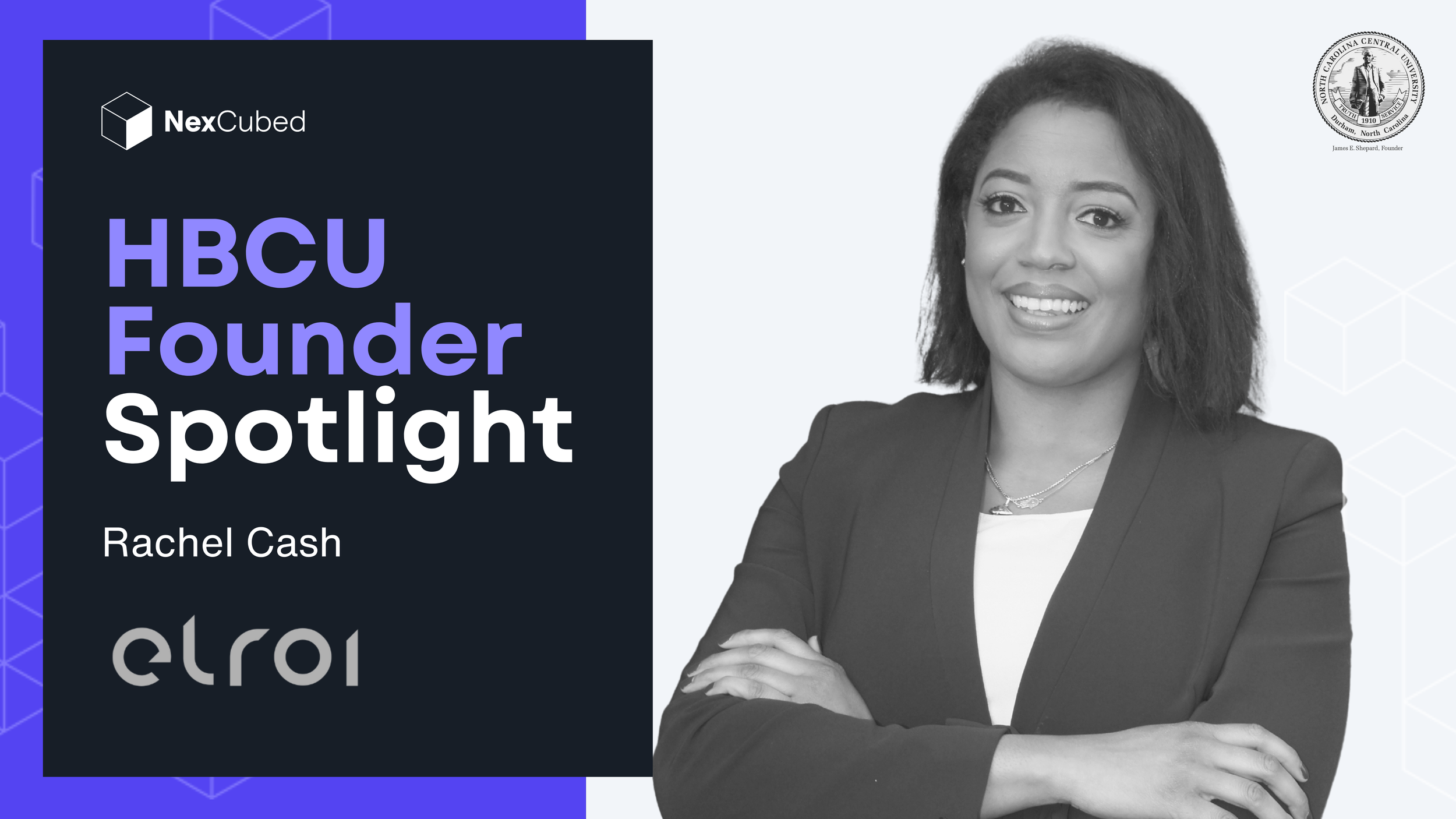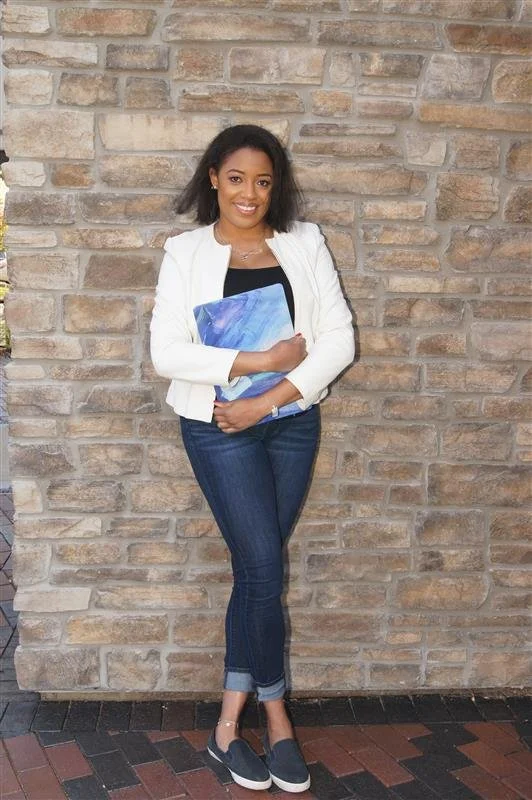HBCU Founders Accelerator Spring 2025 Cohort Spotlight: Meet Rachel Cash from Elroi
This Spring, we launched the fourth cohort of the HBCU Founders Accelerator Program. Over the next several weeks, we’ll be shining a spotlight on the remarkable founders and their entrepreneurial journeys. Meet Rachel Cash from Elroi!
Can you tell us a little about your background and what inspired your entrepreneurial journey?
When I went to law school, I always thought I’d end up on the business side. But I fell in love with constitutional rights—especially the idea that people should own and control their identity. I wrote papers on owning one’s persona through trademark law, and that passion deepened as the CPPA emerged. Later, while working at an insurance company, I saw firsthand how personal data was being used without transparency or consent. That’s when it clicked: this wasn’t just a legal issue—it was a human one. I saw a real opportunity to fight for data ownership as a right, not a privilege. That’s what inspired me to launch Elroi.
What problem is your startup solving and what inspired you to tackle this issue?
Elroi is solving the problem of data inequality, where companies profit from personal data while individuals are left out of the equation. Most people have no idea how their data is collected, shared, or monetized, and they have little control over it. This lack of transparency and consent is especially harmful to vulnerable communities, who often experience the worst consequences of data misuse. I was inspired to tackle this issue after years of working in privacy law and seeing how broken the system is. I started by helping organizations manage consent and compliance, but I kept coming back to one question: what about the people? Elroi flips the model, giving individuals control and creating a secure space where they can decide what to share, with whom, and for what benefit. It’s about making privacy accessible, actionable, and fair.
What have been some of the biggest challenges you have faced while building your startup, and how did you overcome them?
One of the biggest challenges we’ve faced is building a two-sided marketplace; it doesn’t work unless both consumers and enterprises show up. We can’t just build for one side; we need demand and trust from both. To address this, we’ve been strategic about our Ideal Customer Profile (ICP), focusing first on institutional partnerships. By partnering with trusted organizations, like colleges, healthcare providers, and nonprofits, we’re able to reach communities who already have relationships with these institutions. This approach helps us onboard consumers more organically, through partners they already know and trust. These institutions also bring their own data use cases, making the enterprise side of the marketplace active from day one. It’s not easy balancing two sides, but by staying focused on where trust already exists, we’re building a stronger, more sustainable ecosystem.
What has been your proudest moment so far?
My proudest moments haven’t just come from product milestones; they’ve come from the people who’ve helped build Elroi and then carried its values into the world. When an intern, student, or teammate suddenly gets it, the vision for a future where privacy and data ownership are non-negotiable, and then goes on to lead at another organization with those same values, that’s when I feel most proud. I’ve mentored students, coached friends, and had deep debates with peers, and when I see them advocating for privacy-first design or applying Elroi’s principles around data rights elsewhere, it reminds me why I started this. I have a big vision for the future of the data economy, but the ripple effect, people taking that vision and making it their own, are powerful moments.
Where do you see your company in 5 years and how do you see it impacting your community?
In five years, I see Elroi as the foundation powering ethical data exchange in the intelligence era. As the world moves faster and people look for ways to earn with less time, data will become even more valuable, especially with the rise of AI. Elroi will sit at the center of that shift, helping consumers take control of their data and benefit from it, while giving organizations access to compliant, real-time insights to drive KPIs and impact. Even if we’re not always in the spotlight, we’ll be the infrastructure behind a more equitable data economy, where privacy, ownership, and value-sharing are the norm. For our community, this means economic opportunity, transparency, and a chance to shape how their data is used, not just be used by it.
What led you to become interested in Nex Cubed? What resources do you believe will be most helpful?
I was drawn to Nex Cubed because of its intentional focus on HBCU grads. I chose to attend an HBCU for law school for the same reason: I wanted to understand the law not just as it’s written, but how it works for and against my community. That context was empowering, and Nex Cubed gave that same energy. The mentors were the most helpful part of the program. They weren’t just successful, they were carefully matched to my industry and my stage of growth. They met me where I was, offered real world insight, and helped me navigate challenges without trying to change my vision. That kind of tailored, values-aligned support made all the difference. I’m deeply grateful, and I know the mentorship and network Nex Cubed provides will continue to be a key part of Elroi’s growth.
What is the most valuable lesson you have learned as a startup founder so far?
One of the most valuable lessons I’ve learned as a founder came from a mentor who made me track my actions each week. We’d go over what went well and what could have been better. That process was surprisingly cathartic; it forced me to slow down, reflect, and take ownership of my growth. I could see the work, the grit, the mistakes, but I could also see progress. It reminded me that building something meaningful isn’t just about wins; it’s about learning, staying grounded, and continuing to show up. That weekly reflection taught me that momentum doesn’t always look like success; it often looks like lessons stacking on top of each other until clarity and breakthroughs come.
What advice would you give to aspiring entrepreneurs who are looking to make their mark in the industry?
To build anything great will take something from you, your time, comfort, and ego but what you gain is powerful. You’ll stop fearing being perceived, because that’s how the right people will find you and see your vision. You’re doing something you’ve likely never done before, so mistakes aren’t optional; they’re necessary. No matter how many mentors you have, some lessons you can only learn firsthand. Continue to learn, stay grounded, and surround yourself with people who will support you and understand as you make your mark.
What advice would you give to other HBCU entrepreneurs around fundraising?
Go where you’re wanted, where investors understand your story and want to build with you. Fundraising is about relationships, and people do business with people they like, know, or trust. So focus on building real connections, not just perfecting a pitch. Just like many of us chose not to attend a PWI, your fundraising path may not look like the traditional startup journey, and that’s okay. Your story, your perspective, and your community are your advantages. Find champions who can open doors and vouch for you. And most importantly, know your terms, what you’re worth, what you’re building, and what kind of partners you need. Don’t let desperation drive the deal. Fundraising isn’t just about getting a check; it’s about finding people who believe in you and will help you grow. Be intentional, be prepared, and stay committed to your vision.
What is one word to describe your journey so far?
Rollcoaster.
Where can readers/listeners/viewers learn more about your business?
IG: elroi_ai
LinkedIn: elroitechnologies




